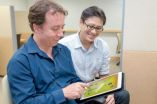(Press-News.org) Exploiting individual genomes for personalized medicine may be more complicated than medical scientists have suspected, researchers at the Virginia Bioinformatics Institute of Virginia Tech have discovered.
In a paper published in June in the journal Aging, scientists from the institute's Medical Informatics and Systems Division found that spontaneous mutations occur in our bodies constantly, but the rate of change differed dramatically among various people.
The study has implications for personalized medicine, which will make use of genomic information to predict future diseases and treatments. With genomes continually shifting over time, the monitoring of genomic health will require more frequent measurement of patients' genomes.
"We have long known that there were mutations acquired in cancerous tumors, but this study confirms that our genome is constantly changing even in healthy tissues," said Harold "Skip" Garner, a professor of biological sciences and computer science at Virginia Tech and a professor of medicine at the Virginia Tech Carilion School of Medicine and Research Institute. "The implications on using genomic information for medicine and medical research in the future are tremendous. Things are not as simple as we once thought."
DNA in our cells changes from exposure to various environmental stressors. This can cause mutations in up to 13,000 genes that raise the risk of diabetes, kidney failure, cancer, rheumatoid arthritis, and Alzheimer's disease — conditions usually associated with aging.
The research may help scientists better understand how individuals tolerate environmental exposure and why some people seem to age faster or slower than others.
"We observed that certain portions of our genome age 100 times faster than others," Garner said. "Microsatellites, once considered 'junk DNA,' are known to be associated with many diseases. They change much faster than individual DNA bases (known as single nucleotide polymorphisms, or SNPs), so it is important that future studies look at this very dynamic part of the human genome."
The researchers used the latest DNA sequencing technology to study the genetic makeup of three individuals at different times in their lives, spanning nine to 16 years. One of the individuals had almost 10 times as many variations as the others, and was found to be at risk for many more potential diseases.
"We observed that the variation rate is specific to the individual and also varies even within an individual's genome," said Jasmin Bavarva, a geneticist at the institute and lead scientist on the project. "Understanding the dynamics of the genome is the key to the success of personalized genomics and this is a major step forward."
INFORMATION:
Additional resources are available at the Virginia Tech News website.
Aging accelerates genomic changes, signaling challenges for personalized medicine
Virginia Bioinformatics researchers characterize rapid genomic changes due to aging
2014-06-24
ELSE PRESS RELEASES FROM THIS DATE:
Young women with PCOS are 5 times more likely to develop type 2 diabetes
2014-06-24
A leading expert on reproductive health says young women with Polycystic Ovary Syndrome (PCOS) have a startlingly higher risk of developing type 2 diabetes, even if young and not overweight.
The research led by Professor Helena Teede and Dr Anju Joham, from the School of Public Health and Preventive Medicine at Monash University analysed a large-scale epidemiological study, called the Australian Longitudinal Study of Women's Health, which revealed the findings.
Over 6000 women aged between 25-28 years were monitored for nine years, including 500 with diagnosed PCOS. ...
New possibilities for leukemia therapy with a novel mode of leukemia cell recognition
2014-06-24
Singapore, 24 June 2014—Scientists at A*STAR's Singapore Immunology Network (SIgN) have discovered a new class of lipids in the leukaemia cells that are detected by a unique group of immune cells. By recognising the lipids, the immune cells stimulate an immune response to destroy the leukaemia cells and suppress their growth. The newly identified mode of cancer cell recognition by the immune system opens up new possibilities for leukaemia immunotherapy .
Leukaemia is characterized by the accumulation of cancer cells originating from blood cells, in the blood or bone marrow. ...
NTU study shows puzzle games can improve mental flexibility
2014-06-24
Want to improve your mental finesse? Playing a puzzle game like Cut the Rope could just be the thing you need.
A recent study by Nanyang Technological University (NTU) scientists showed that adults who played the physics-based puzzle video game Cut the Rope regularly, for as little as an hour a day, had improved executive functions.
The executive functions in your brain are important for making decisions in everyday life when you have to deal with sudden changes in your environment – better known as thinking on your feet. An example would be when the traffic light ...
Cancer: The roots of evil go deep in time
2014-06-24
Every year around 450,000 people in Germany are diagnosed with cancer. Each one of them dreams of a victory in the battle against it. But can cancer ever be completely defeated? Researchers at Kiel University (CAU) have now reached a sobering conclusion: "cancer is as old as multi-cellular life on earth and will probably never be completely eradicated", says Professor Thomas Bosch in his latest research results. The study by an international team led by Bosch was published today (Monday, June 24) in the prestigious scientific journal Nature Communications.
The so-called ...
The great salmon run algorithm
2014-06-24
Solving complex problems is rarely a straightforward process, there are often many variables and countless plausible solutions each one of which has its pros and cons. Mechanical engineers at the Babol University of Technology in Mazandaran, Iran, have turned to nature to devise an algorithm based on the survival trials faced by salmon swimming upstream to the spawning grounds to help them fish out the optimal solution to a given problem. They provide details in the International Journal of Computer Applications in Technology.
Bio-inspiration has been widely used in problem ...
Restricting competitors could help threatened species cope with climate change
2014-06-24
Threatened animal species could cope better with the effects of climate change if competition from other animals for the same habitats is restricted, according to new research by Durham University.
The Durham team studied the impacts of climate on the Alpine Chamois, a species of mountain goat, and the effects that domestic sheep had on the goats' movements.
Observing the goats in the Italian Alps during the summer, the researchers found that Chamois tended to move to higher altitudes where it is cooler on hotter days and in the middle of the day, but moved much higher ...
The National Health Service -- committed to failure?
2014-06-24
London (24 June 2014). A project has failed. So why continue to invest in it? This is a pertinent question for large organisations, like the UK National Health Service, which has a history of investing vast amounts of taxpayer's money into unrealistic and ultimately unsuccessful projects. According to business experts, organisations develop blind spots due to a perfect storm of unworkable policies and defensive behaviour. In fact, organisations and individuals have a few things in common, psychologically speaking, when it comes to throwing good money after bad, the experts ...
Dental hygiene profession sees moment of opportunity to improve access to oral health care
2014-06-24
St. Louis, June 23, 2014 – With opportunities to take increased responsibility for oral health care and to deliver care in a more comprehensive way, it's an exciting time in the profession of dental hygiene. To help prepare to meet these challenges, the editors of The Journal of Evidence-Based Dental Practice (JEBDP) present the Annual Report on Dental Hygiene, a collection of cutting-edge research and practice updates in the field of dental hygiene.
The JEBDP is the foremost publication of information about evidence-based dental practice and is published by Elsevier, ...
Cell division discovery could optimise timing of chemotherapy and explain some cancers
2014-06-24
Research led by the University of Warwick's Systems Biology Centre and Medical School in collaboration with groups in Nice and Rotterdam has been able to demonstrate how the cycle of cell division in mammalian cells synchronises with the body's own daily rhythm, its circadian clock.
The study not only helps to explain why people with sustained disrupted circadian rhythms can be more susceptible to cancer, it may also help establish the optimal time of day to administer chemotherapy.
In a paper entitled Phase locking and multiple oscillating attractors for the coupled ...
Growing unknown microbes 1 by 1
2014-06-24
Trillions of bacteria live in and on the human body; a few species can make us sick, but many others keep us healthy by boosting digestion and preventing inflammation. Although there's plenty of evidence that these microbes play a collective role in human health, we still know very little about most of the individual bacterial species that make up these communities. Employing the use of a specially designed glass chip with tiny compartments, Caltech researchers now provide a way to target and grow specific microbes from the human gut—a key step in understanding which bacteria ...
LAST 30 PRESS RELEASES:
Celebrity dolphin of Venice doesn’t need special protection – except from humans
Tulane study reveals key differences in long-term brain effects of COVID-19 and flu
The long standing commercialization challenge of lithium batteries, often called the dream battery, has been solved.
New method to remove toxic PFAS chemicals from water
The nanozymes hypothesis of the origin of life (on Earth) proposed
Microalgae-derived biochar enables fast, low-cost detection of hydrogen peroxide
Researchers highlight promise of biochar composites for sustainable 3D printing
Machine learning helps design low-cost biochar to fight phosphorus pollution in lakes
Urine tests confirm alcohol consumption in wild African chimpanzees
Barshop Institute to receive up to $38 million from ARPA-H, anchoring UT San Antonio as a national leader in aging and healthy longevity science
Anion-cation synergistic additives solve the "performance triangle" problem in zinc-iodine batteries
Ancient diets reveal surprising survival strategies in prehistoric Poland
Pre-pregnancy parental overweight/obesity linked to next generation’s heightened fatty liver disease risk
Obstructive sleep apnoea may cost UK + US economies billions in lost productivity
Guidelines set new playbook for pediatric clinical trial reporting
Adolescent cannabis use may follow the same pattern as alcohol use
Lifespan-extending treatments increase variation in age at time of death
From ancient myths to ‘Indo-manga’: Artists in the Global South are reframing the comic
Putting some ‘muscle’ into material design
House fires release harmful compounds into the air
Novel structural insights into Phytophthora effectors challenge long-held assumptions in plant pathology
Q&A: Researchers discuss potential solutions for the feedback loop affecting scientific publishing
A new ecological model highlights how fluctuating environments push microbes to work together
Chapman University researcher warns of structural risks at Grand Renaissance Dam putting property and lives in danger
Courtship is complicated, even in fruit flies
Columbia announces ARPA-H contract to advance science of healthy aging
New NYUAD study reveals hidden stress facing coral reef fish in the Arabian Gulf
36 months later: Distance learning in the wake of COVID-19
Blaming beavers for flood damage is bad policy and bad science, Concordia research shows
The new ‘forever’ contaminant? SFU study raises alarm on marine fiberglass pollution
[Press-News.org] Aging accelerates genomic changes, signaling challenges for personalized medicineVirginia Bioinformatics researchers characterize rapid genomic changes due to aging


